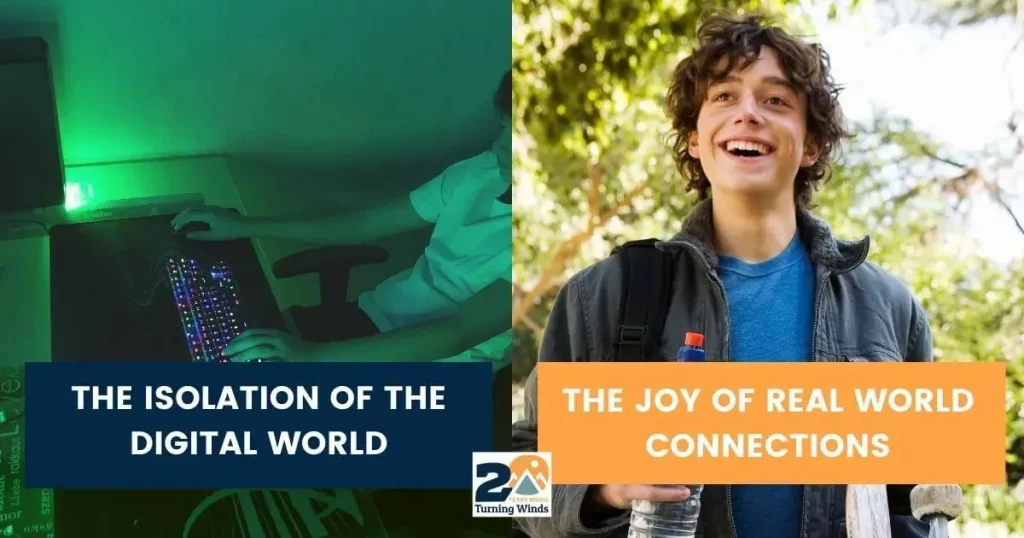Today’s teenagers live in a world saturated with technology, a world unknown to their parents when they were that age. Smartphones, tablets, laptops, and other electronic devices are everywhere and hard to avoid.
The pervasive nature of social media and technology overuse use seems unavoidable, but for many young Americans, social media platforms have had a very negative impact on their actual socialization—the developmental processes through which human beings acquire the values, behaviors, and motivations necessary to become competent members of their culture.
In an advisory published last year, Surgeon General Vivek Murthy called the impact of social media a public health crisis. “Extreme, inappropriate, and harmful content continues to be easily and widely accessible by children and adolescents,” Dr. Murthy wrote. “Social media use by youth is nearly universal. Up to 95 percent of youth ages 13–17 report using a social media platform, with more than a third saying they use social media almost constantly.”
Last July, the American Federation of Teachers, the American Psychological Association, Design It For Us, Fairplay, and ParentsTogether published a report entitled “Likes vs. Learning: The Real Cost of Social Media for Schools,” in which the partners drew attention to the widespread negative impact of social media on children’s well-being, including increased anxiety, depression, and addiction-like behaviors.
DIGITAL HEROIN? THE DANGERS OF SOCIAL MEDIA & EXCESSIVE SCREEN TIME
“Many of our clients struggle socially when they arrive here,” says Turning Winds therapist Sean Carlin. “We’ve developed into a country where we are hooked to our electronics and we do everything with them. It’s a big piece of why these kids are here today.”
In his 2022 book Digital Madness, psychologist Nicholas Kardaras described the devastating impact of this habit, especially on teenagers and young adults. “Research shows that the empty, sedentary, addicting, isolating, and self-loathing lifestyle created by Big Tech drives depression and hopelessness,” he writes. “Yet the more depressed and empty we feel, the more we’re driven to escape those feelings with more of the digital drug that’s driving the problem to begin with—a classic addiction catch-22.” In his previous book Glow Kids, Dr. Kardaras called the effects of excessive screen time on children “digital heroin.”

TEEN ISOLATION, LOST CONNECTIONS, LOST SELVES
“Many of the kids we treat struggle with identity, isolation due to excessive social media use and have no clue who they are,” explains Carlin. “They retreat into a digital world, missing out on the crucial face-to-face interactions that foster healthy social skills.” They shut themselves in their rooms because they falsely believe they can have a full life on that computer screen and with that telephone.”
The turning point, the COVID-19 pandemic. “It was already bad before COVID but then kids got in the habit of ‘I have everything right here. I don’t have to leave my room and hang out with my family.’ So you don’t develop those relationships with your family, you’re not developing those social skills, those executive functioning skills by getting out in the real world and dealing with it. These teens don’t know how to regulate themselves because they are so used to functioning on these devices.”
REBUILDING REAL HEALTHY RELATIONSHIPS
The Turning Winds program aims at effecting comprehensive change, helping teens struggling with anxiety, depression, or other mental challenges related to technology overuse. Our success comes from a combination of therapeutic and educational approaches and focuses on the overall well-being of each teenager in our care. And, that providing the best outcomes possible for each child. These therapeutic approaches—many unique to our hybrid residential treatment program—include character development, leadership skills, health and wellness, experiential learning, evidence-based clinical treatment, and academic support and engagement. Together, these focus areas constitute the Five Pillars that promote therapeutic change.
“This program works because we build relationships with these kids. The more of a relationship therapists have, the more of a positive impact they can have on these kids,” says Carlin. “Besides that, we take away their cell phones—and their computers. Besides school use, they don’t have access to computers here. Even TV time is limited.”
“It forces these kids to think outside the box and try things that they may not ever have tried before in their lives because they have no phone, they have no computer, they have no video games. So now they have to go out and learn new social skills.”
Instead of screen time, clients get to enjoy a lot of outdoor activities: During the winter months, they are on skis a lot. There is also snowshoeing, ice fishing, ice skating, as well as cross-country and downhill skiing. “They build relationships, learn how to think critically, and they learn how to get along with others,” Carlin says.
Many Turning Winds clients arrive angry, confused, and unsure of where to start. “The key is building that relationship,” says Carlin. “You see it with the therapists, the staff, our leadership. Everybody here has a relationship with these kids. And we’re able to use these relationships to shape and mold these kids. We’re motivating them to think in a healthier way.”
TURNING WINDS: BREAKING FREE FROM UNHEALTHY TECH HABITS
The Turning Winds experience helps teen break free from unhealthy tech habits. Instead, they try new activities, and develop the social skills that are often stunted by excessive screen time. They gain confidence and build authentic friendships that are missing in the digital world.
At Turning Winds, it’s the people who make the difference. Over two decades, we’ve built a team of some of the world’s finest academic and therapeutic professionals, all of whom share the same goal: to help teens re-engage meaningfully with their lives, families, and their futures.
Our mission is to rescue teens in crisis, renew their belief in their potential, reunite them with their families, and put them on a sustainable path to success.
Is your teen struggling with anxiety, isolation, or unhealthy tech habits? Contact us online for more information, or call us at 800-845-1380. If your call isn’t answered personally, one of us will get back to you as soon as possible.









